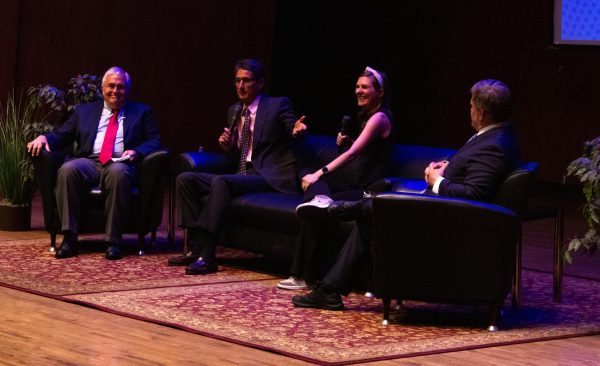Douglas Brinkley, presidential historian and professor in humanities at Rice University delivered the 10th renewal of the University of Kentucky’s Wendell H. Ford Public Policy Lecture.
“Reflections on the 2024 presidential election,” sponsored by the Martin School of Public Policy and Administration, allowed those in attendance to hear from Brinkley, several UK professors and journalist Al Cross on Oct. 8.
Brinkley is the author of more than 30 books, often on CNN for his presidential history commentary, a contributing editor at Vanity Fair and has won two Grammy Awards.
Brinkley began his lecture by delving into the country’s first presidential figures, beginning in 1776, working his way through the modern age of the presidency. He discussed the 1800 election when Democrat-Republican Party Thomas Jefferson and Federalist John Adams ran against each other.
“Things exploded like they are now in our country, in a way, with Trump and Harris. Not that there’s equivalency, but it was brutal because we do not have in our constitution anything about two parties. Nobody said every year there are going to be two parties in the United States,” Brinkley said.
Charles Thompson was worried about the polarization between the supporters of Jefferson and Adams, wondering how they would survive a brutal election like that one, according to Brinkley.
“Where you have now, if you’re a Harris person, a Democrat, how are you going to grapple with Trump becoming president,” Brinkley said. “If you’re a Trump person, how do you grapple with Harris when it gets so…arduous and that a vitriol gets so extreme?”
The polarization seen in the political parties today has been increasing steadily since the 1990s, according to Brinkley, comparing what we see today to the racial polarization in the 1970s.
“It’s just gorgeous when… you can read Jefferson on notes of Virginia, and you find bigotry and racism in Jefferson that’s also equal in mind, and it reminds you that these presidents aren’t complicated figures,” Brinkley said. “We have to learn to look at all of our leaders, not from rose-tinted glasses, or not from the bully pulpit of disdain, but just as how presidents try to move the meter of their times and who’s mattered and who’s not.”

The issues dealt with in modern-day politics and society are not equal to what was grappled with during the death of Abraham Lincoln and the division in the country that America felt back then, according to Brinkley.
“The Civil War reminds us that our own times are not uniquely oppressive,” Brinkley said. “We’ve had these minutes, moments, but it is a perilous time right now.”
Brinkley mentioned the creation of the Federal Emergency Management Agency (FEMA) from President Carter, as well as his creation of the Department of Energy. Then in 1980, Ronald Reagan won the election.
“From ‘80 up until Trump, we’ve been living in the shadow of Ronald Regan, who was a successful two-term president,” Brinkley said. “There’s a beginning with Reagan of saying ‘the government’s ripping you off, federal government’s overcharging. You’re paying too much taxes. You’re being gouged.’ And it gets continued.”
Brinkley said Obama was a talented president, but without his elimination of Osama Bin Laden, he wouldn’t have beaten Mitt Romney in the second term.
“(With) Obama, then we’re in something different. The age of Reagan is over, and the age of FDR is over,” Brinkley said. We are in this new zone that nobody is quite sure of where we’re at, and that’s why there’s so much frightening feeling here, because Trump, there’s all the other presidents…and then there’s Trump.”
Regarding Biden, Brinkley said that since he’s been a fairly likable president and had some “Obama shine,” Biden was able to defeat Trump.
“I think Trump, it wasn’t the debate with Biden, because he wasn’t that great,” Brinkley said. “But I think being shot in Butler mattered. I mean, the fact that he was shot and that there’s blood coming, and used the ‘fight and fight and fight’ and he had a moment in the Milwaukee convention, and he unified.”
Another possible impact on the election involves the recent hurricane Helene. With its impact on so many U.S. communities, Brinkley mentioned how this could potentially affect voting.
“How many Republican towns got decimated? Will those communities be able to vote? Is North Carolina really a swing state? Is Georgia being kind of controlled now by the Republican Party?” Brinkley said.
Brinkley discussed the “gender discrepancy with young men for Trump and young women for Harris,” and how Generation Z doesn’t care for their select candidate, particularly with Biden.
Ending his lecture, Brinkley expressed concerns about whether or not the election will be deemed fair at the end, warning of the possibility of a tight election that demands recounts.
“Whoever wins guys, and this will be a reprehensible statement, we gotta get behind whoever wins to be our president,” Brinkley said. “We have to live by the great Paul Robert Frost, ‘the only way out is through.’”
Brinkley said to the audience to not sit on the sidelines, to register to vote and vote what they think and said Obama’s “great line” was telling the audiences “Don’t boo, vote.”





























































































































































